
SEIU Local 1000’s fight against Governor Newsom’s Return-to-Office Mandate
Our Fight Against CHP’s RTO Policy
On July 8, 2025, SEIU Local 1000 issued a cease-and-desist to CHP regarding its decision to unilaterally require employees back into office five days a week. Despite this, CHP has continued with their RTO policy.
In response, our legal team filed an Unfair Practice Charge (ULP) with the Public Employment Relations Board (PERB) on August 25, 2025. We are committed to fighting for our members and will provide updates as the process moves forward.
“The California State Auditor’s new telework report confirms what we’ve been saying all along: telework works. It saves the State hundreds of millions of dollars, reduces traffic and pollution, and helps recruit and retain the best workers. In the most comprehensive survey of its kind, both rank-and-file and management agreed: telework improves work-life balance, cuts costs, strengthens recruitment and retention, and doesn’t hurt productivity or customer service.
We thank Assemblymember Josh Hoover for calling for this audit, which makes clear what’s at stake for taxpayers and state workers. That’s why we’re calling on the Legislature to reclaim control of telework policy and require departments to maximize telework where it works best.”
When We Fight, We Win!
Our SEIU Local 1000 bargaining team reached a side letter of agreement with the state that pauses RTO through July 1, 2026. Read the full details below:
Break Down of Our Side Letter Wins
Check out the victories we secured through our latest side letter agreement. These wins are a direct result of member action and unity. Download and print our flyer to distribute to your coworkers! We’re stronger when we’re informed!
Side Letter of Agreement – Frequently Asked Questions
1. My department is still requiring me to come into the office even after this agreement. Is that allowed? What can I do?
2. Can departments force employees, including those hired under 100% telework agreements, back to the office on day 91?
No. The Governor’s 4-day RTO mandate is delayed for at least a full year — until July 1, 2026. During the first 90 days after the agreement’s ratification, departments are completely blocked from making any new telework changes. After that, they must provide 30 days’ formal notice and meet-and-confer with the union before implementing any changes.
3. Why was the California Highway Patrol (CHP) excluded from the RTO suspension?
4. Will we have to fight RTO all over again after the 90-day pause?
We Took Action Against CHP
On Monday, we filed a cease and desist letter with the California Highway Patrol (CHP) and requested a formal meeting. We fought to make sure the return-to-office (RTO) pause applied to all SEIU Local 1000-represented departments, but the State forced us to leave CHP out. That’s why we took action and why we’ll keep fighting to protect telework and stand up for our members.
If you work at CHP, get involved. Become a job steward. The more of us who are informed and can take action, the more power we have to win!
Display Your Support for Telework on Zoom and Teams Calls!
Every time you use this background, you’re sending a powerful message: State workers have proven hybrid work works. It’s an easy, impactful way to show solidarity and raise awareness about the importance of continuing telework for California’s workforce.
Download Printable Flyers to Support Telework at Your Worksite
Download and print our Telework Works for CA flyers to post on bulletin boards, bring to union events, or use during worksite actions. It’s a simple, visible way to show solidarity and remind others that hybrid work works.

Bargaining Agreement Reached: RTO Paused
June 29, 2025
We’ve reached an agreement with the State that protects your raise, pauses the return to office order, and gives us a path to bargain again in 2026.
Earlier this year, Governor Newsom and the State Legislature asked all unions to return to the table to address the state’s budget crisis. When they canceled our negotiated raise, SEIU Local 1000 pushed back. Through tough negotiations, we secured an agreement that defends what we won and limits the impact on workers.
Legal Action Against the Governor and CalHR
June 20, 2025
Today, on behalf of affected state employees, SEIU Local 1000 and President Anica Walls filed a lawsuit against Governor Gavin Newsom and the California Department of Human Resources (CalHR), challenging the legality of the Governor’s Return-to-Office (RTO) mandate that forces most state employees back into physical offices at least four days per week starting July 1, 2025.
This legal filing, known as a writ of mandate, was submitted in Alameda Superior Court and argues that the Governor’s order violates state law and the Administrative Procedure Act (APA) by imposing a major workplace policy—an illegal “underground regulation”—without legal authority, public input, or notice to our Union.
“This is not just about office attendance—it’s about transparency, accountability, and respect for the law,” said President Walls. “State workers successfully transitioned to telework during the pandemic, saving taxpayer dollars, reducing pollution, and improving service delivery. The Governor is now attempting to undo that progress behind closed doors and with unilateral action.”
Over the past several years, state departments have reduced office space and adapted to hybrid work, saving the state at least $700 million. Our filing highlights the enormous new costs it would take to reverse that shift—potentially costing taxpayers hundreds of millions of dollars each year—costs that were never considered in the state budget or legislative process.
We’re doing everything we can to protect the rights, health, and financial security of all the state employees we represent. This fight for fair and legal working conditions isn’t over. We’re demanding accountability—not empty promises—and we will keep pushing back against any effort to ignore the democratic process or silence our voices.
Next Stop — Formal PERB Hearing
June 19, 2025
After unsuccessful attempts to reverse the state’s decision through required settlement talks, Local 1000 is moving forward with a full evidentiary hearing to challenge the State’s unilateral imposition of a mandatory four-day Return-to-Office (RTO) policy.
Continue Reading...
During the settlement meeting, our Union called on the Governor to rescind the RTO mandate, arguing it was imposed in violation of the Dills Act — the law that protects our right to bargain over changes to working conditions. Local 1000 maintains that the order was issued without proper consultation or good-faith bargaining, overstepping what the State is legally allowed to do.
We’re committed to defending our members’ rights and the integrity of the bargaining process.
“Our position is simple: the State cannot disregard its duty to negotiate over matters that directly impact employees’ working conditions,” said President Walls. “We didn’t pick this fight, but we won’t back down from it either.”
The case now heads to a full evidentiary hearing before the Public Employment Relations Board (PERB), where the facts will be presented and a legal decision made.
PERB Conference on Thursday, June 19th
June 18, 2025
SEIU Local 1000 will appear before the Public Employment Relations Board (PERB) to fight back against the Governor’s Return-to-Office (RTO) mandate.
Continue Reading...
We filed an unfair practice complaint after the State unilaterally announced a major change to telework policy—without properly notifying our Union or giving us the chance to meet and confer, as required by our contract. The Executive Order mandating four in-person workdays per week violates the Dill’s Act, which protects our right to bargain and ensures existing telework agreements stay in place unless negotiated. This informal conference is a critical step in our legal fight to protect your telework rights.
California Department of Education (CDE) Reverses Course on RTO Mandate
June 9, 2025
Per Superintendent Thurmond, the California Department of Education (CDE) is NOT going back to the office four days per week!
PERB Issues Complaint in Response to SEIU Local 1000’s Unfair Practice Charge (UPC) Regarding the RTO Mandate
May 13, 2025
SEIU Local 1000 Files Legal Action to Challenge the RTO Mandate
March 3, 2025
Yesterday, SEIU Local 1000 officially filed an Unfair Practice Charge (UPC) with the Public Employment Relations Board (PERB), standing together with PECG workers in taking legal action against the Governor’s executive order on return to office. Read the full filing here.
Continue Reading...
This filing is a direct challenge to an unlawful mandate that violates our members’ collective bargaining rights under the Dills Act and disregards our contract. The Governor imposed this order unilaterally, without negotiation, without consideration for its impact on state workers, and without following the law.
We’re demanding that PERB rescind this illegal order immediately and return decision-making on telework and return-to-office policies back to individual departments, where it belongs. Agencies should be making operational decisions based on business needs – not political mandates.
Contact the Member Resource Center
If you believe you might qualify for a reasonable accommodation, start by contacting your department lead—this could be your first-line supervisor, personnel specialist, or HR department. They can provide details on your department’s return-to-work policies and the process for requesting accommodations. Once you have your department’s reasonable accommodation policy and telework agreement, contact the Member Resource Center (MRC) for guidance.
📞 Call: (866) 471-7348
🕒 Hours: Monday – Friday, 7 a.m. – 7 p.m.
The MRC can help you understand your options and navigate the request process.
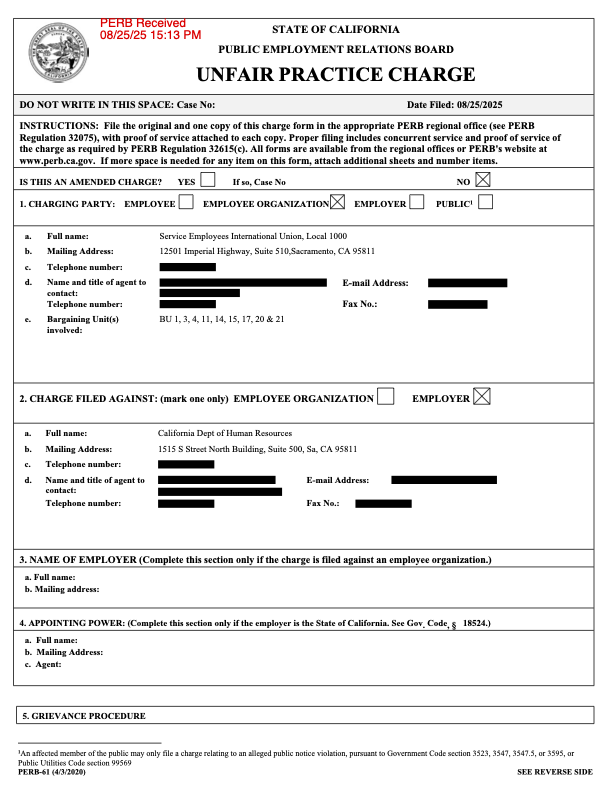
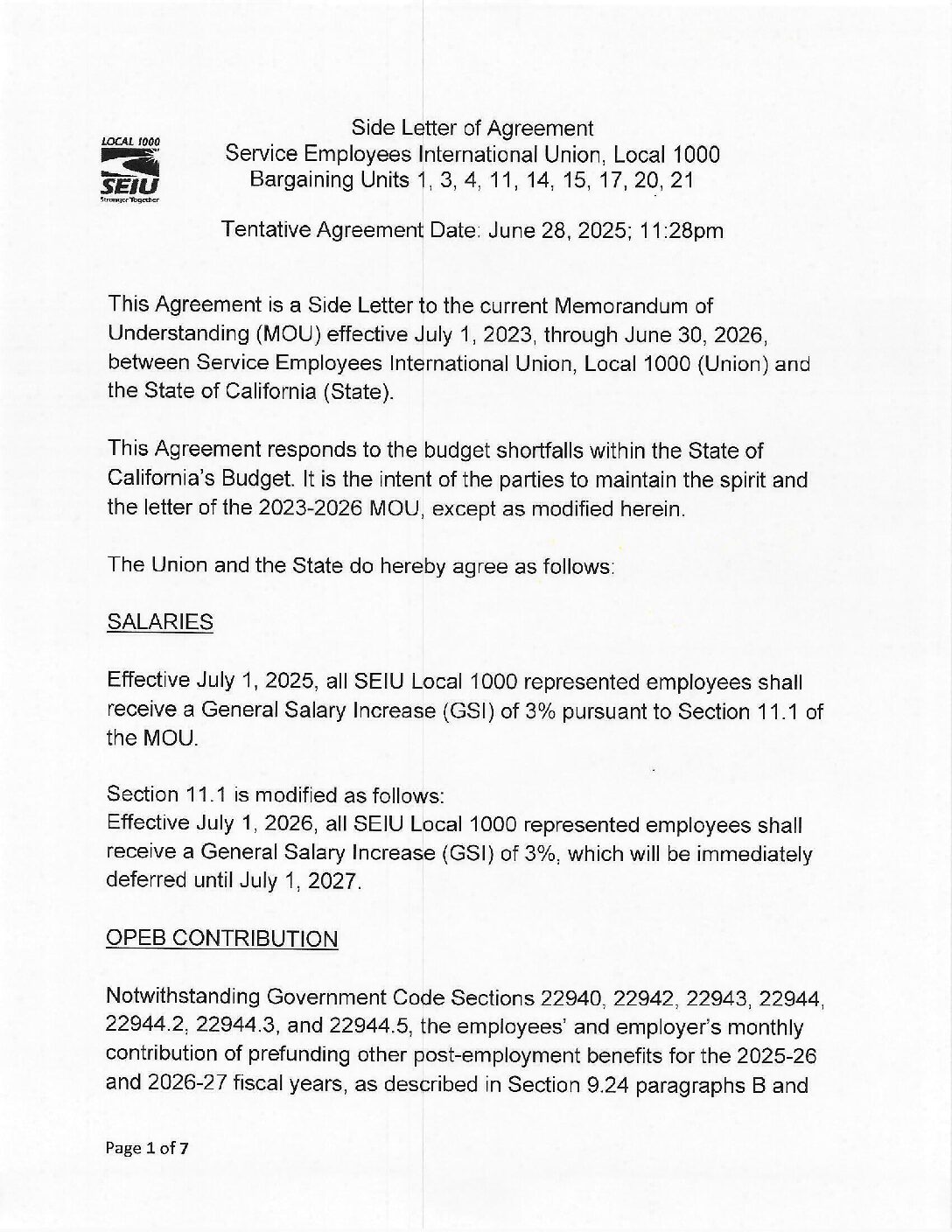
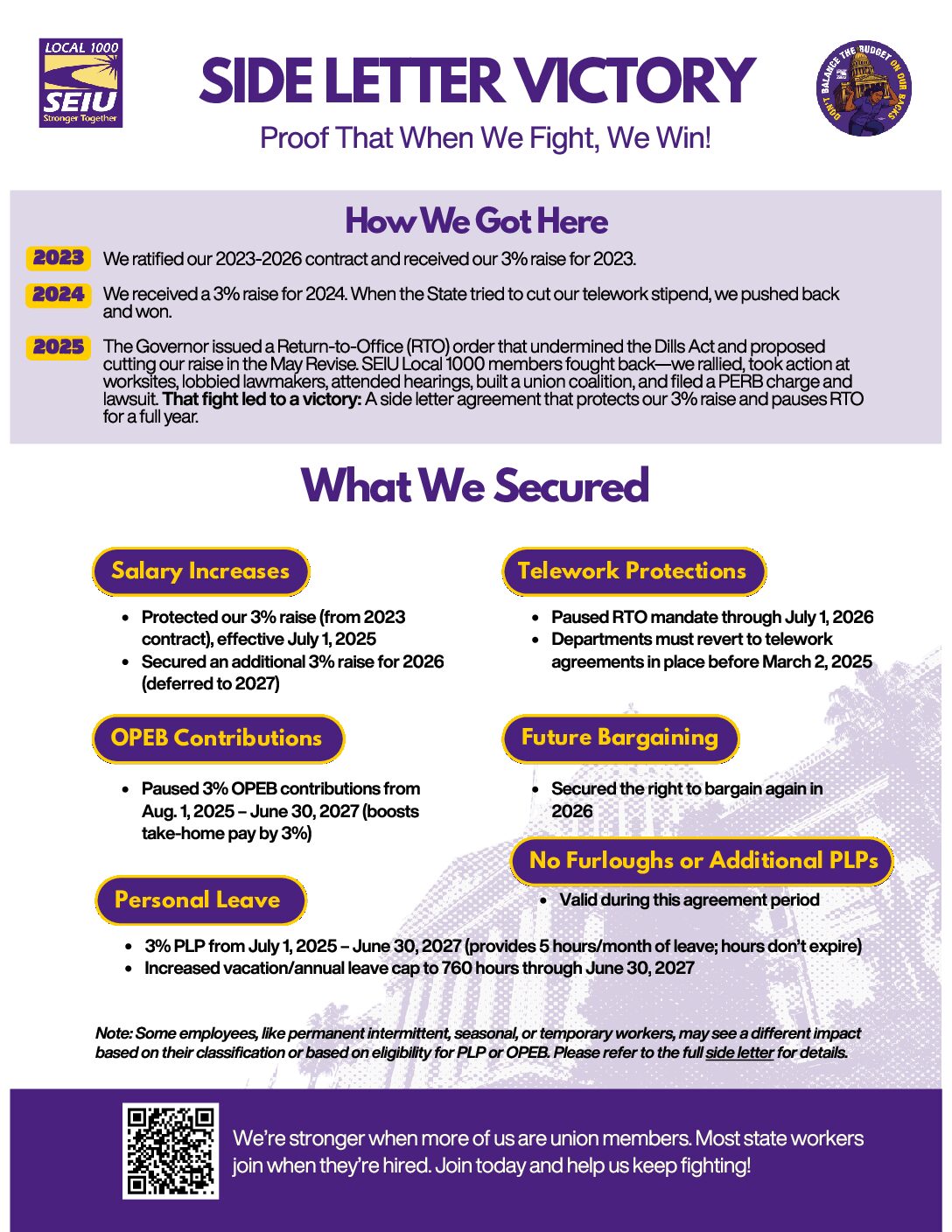
![REDACTED Cease and Desist - CHP RTO 7.8.25[54]](https://www.seiu1000.org/wp-content/uploads/2025/07/REDACTED-Cease-and-Desist-CHP-RTO-7.8.2554-pdf.jpg)






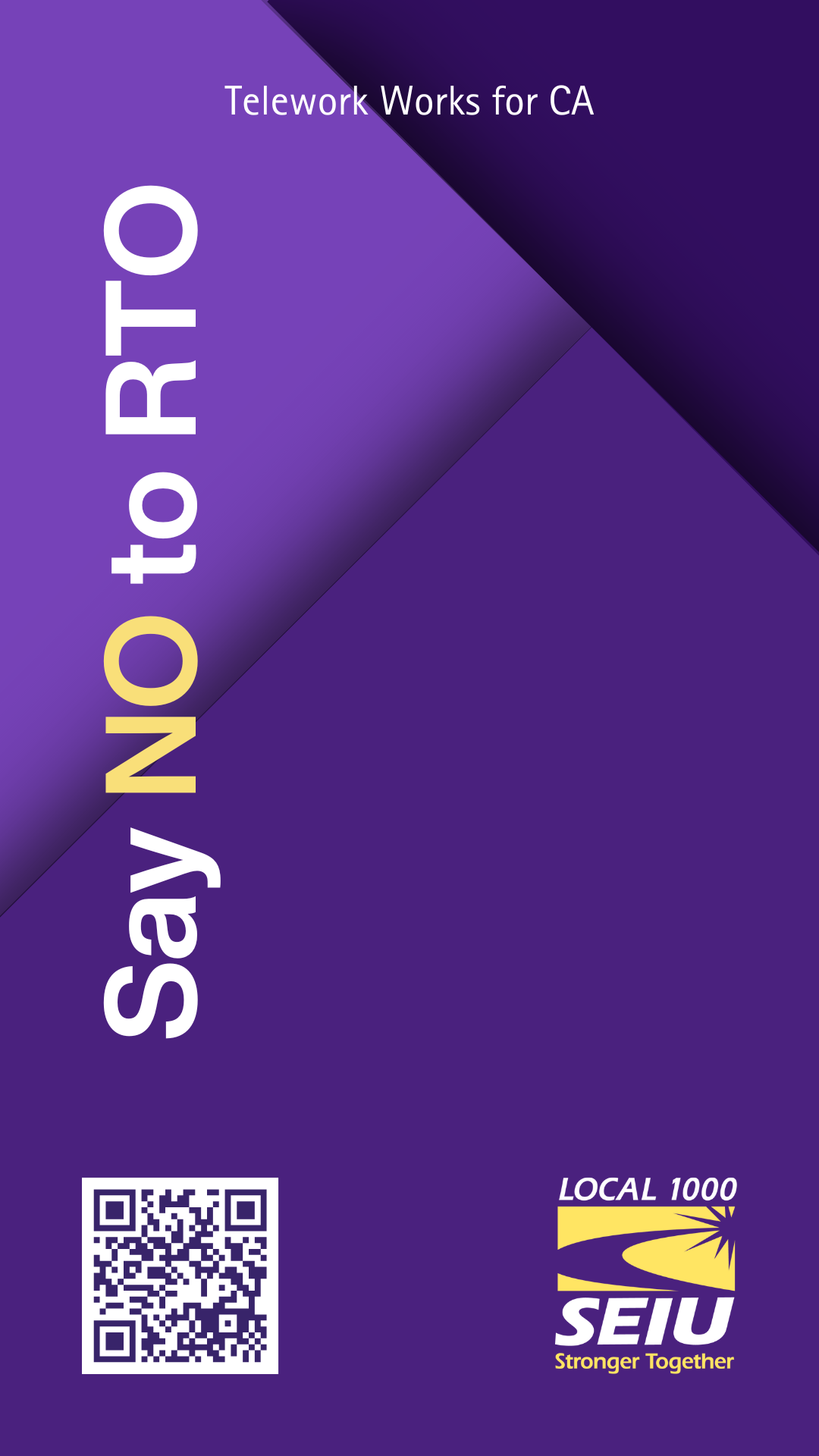
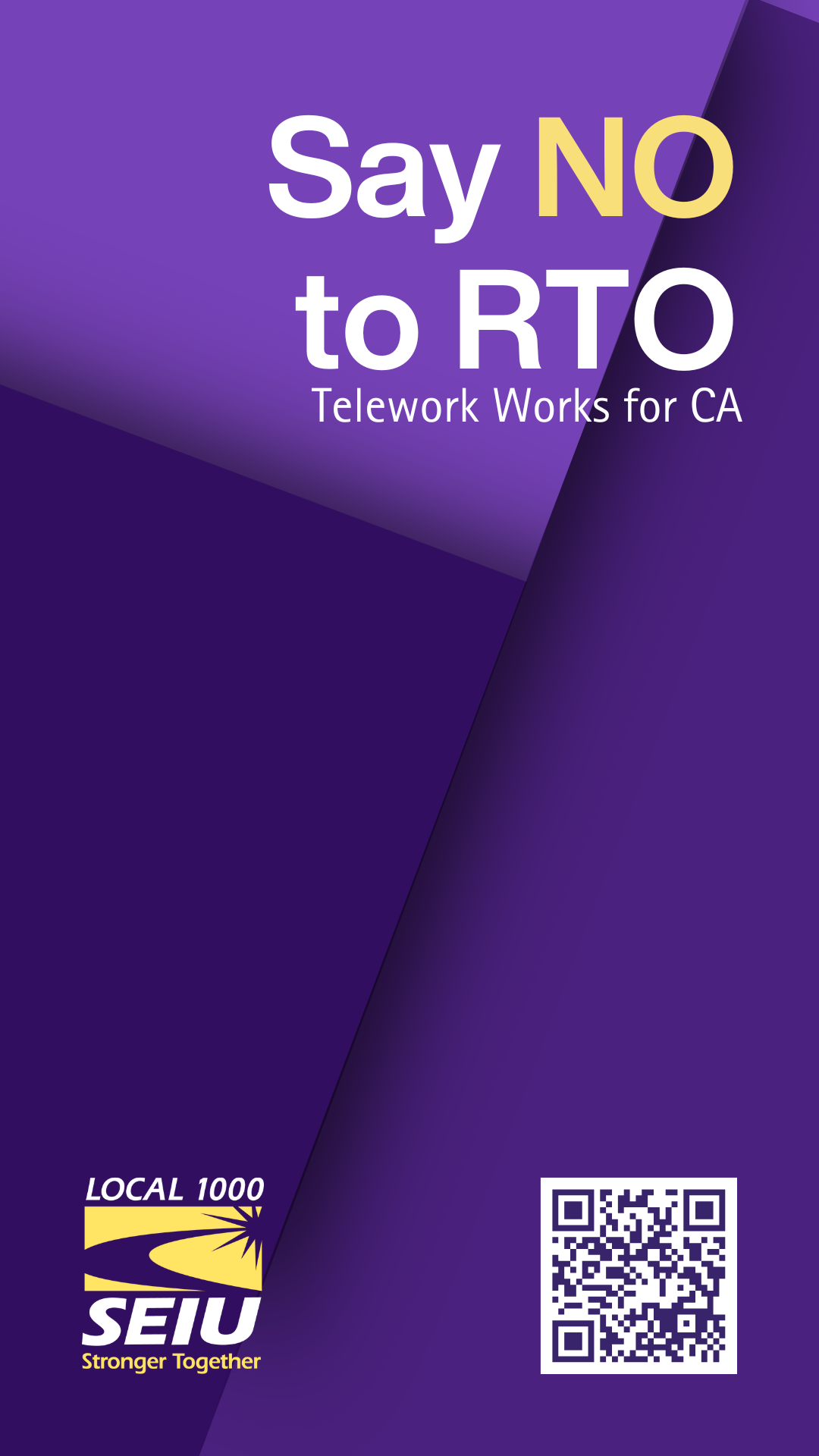


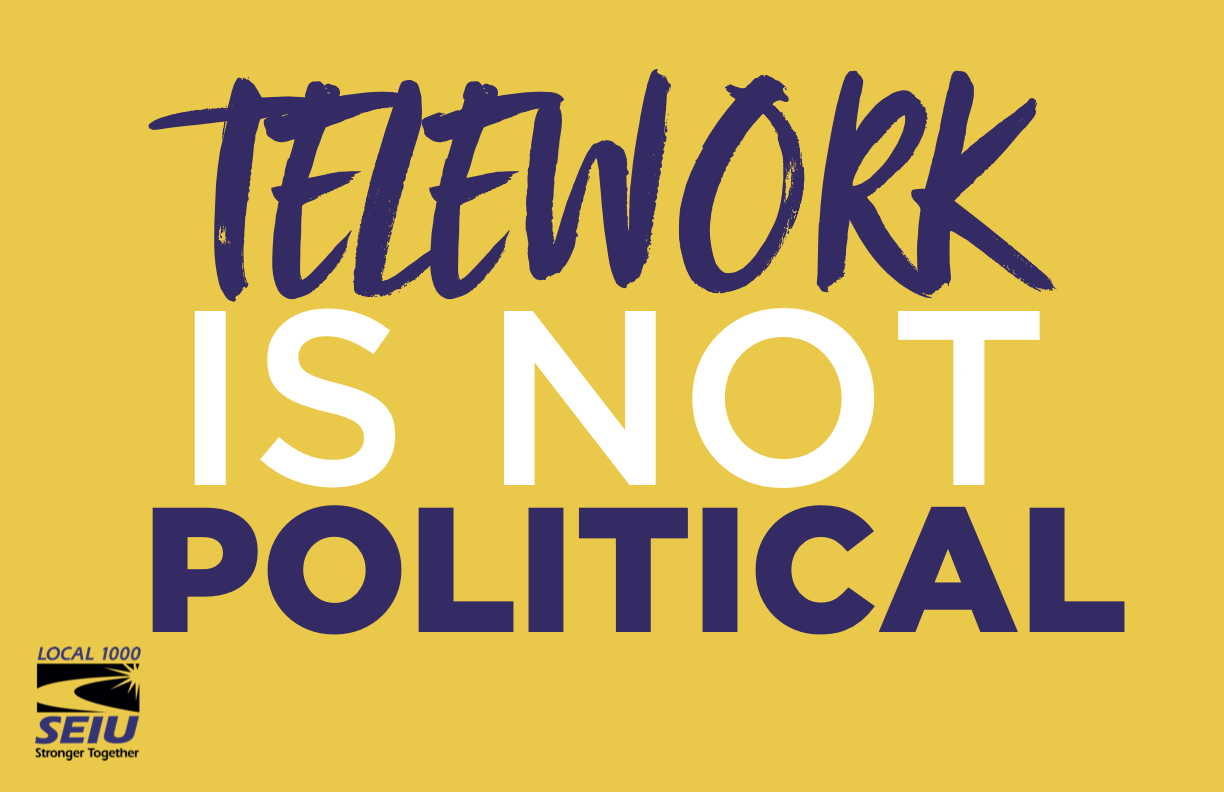


Telework was not only useful during the pandemic. Its benefits are endless; saves us high gas costs, minimizes toxic air pollution, rent costs for state offices, parking fees for employees, time spent driving in overcrowded freeways/streets, etc. It defeats the purpose of having city-funded e-bikes, scooters, e-vehicles that supposedly were meant to preserve the environment and yet we are now back to work everyday en masse. Why is the system contradicting its own efforts to preserve our environment?